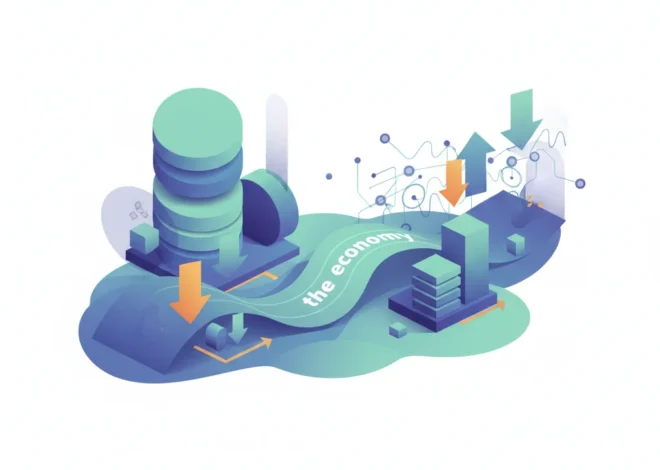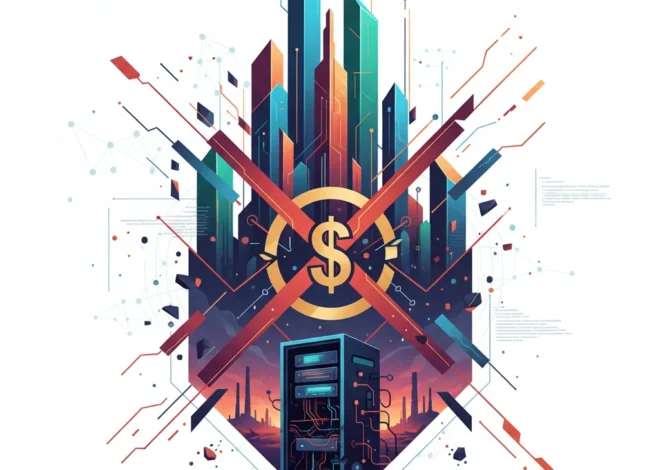
The AI Gold Rush Hits a Speed Bump: Is the Tech Bubble About to Burst?
It was the party that seemed like it would never end. For months, the tech world, and by extension the global stock market, has been riding an exhilarating wave powered by one thing: artificial intelligence. Fueled by staggering breakthroughs in machine learning and generative AI, investor enthusiasm propelled markets to record highs, with companies even tangentially related to AI seeing their valuations soar into the stratosphere. But as any seasoned pro knows, what goes up must eventually face a reality check. And it looks like that moment has arrived.
The first tremors were felt in the US, where a sell-off in high-flying tech stocks sent a nervous ripple across Wall Street. Now, that ripple has become a wave, crashing onto Asian shores and dragging markets down with it. According to a recent report from the Financial Times, this downturn signals a growing anxiety among investors that the hype surrounding AI valuations may have outpaced the reality of a profitable future.
So, what’s really going on? Is this the beginning of the end for the AI boom, or just a healthy correction on the path to revolutionary change? Let’s break it down.
From Wall Street to Tokyo: The Global AI Sell-Off
The recent market turbulence wasn’t confined to a single region; it was a global contagion of caution. After US tech giants, particularly those in the semiconductor space, experienced a significant dip, the sentiment quickly spread east. The enthusiasm that had been a primary driver of market gains began to wane, replaced by a more sober assessment of the road ahead.
Here’s a quick snapshot of how the sell-off impacted key markets across Asia, reflecting the interconnected nature of our global tech economy:
| Region/Index | Market Performance | Key Contributing Factors |
|---|---|---|
| Japan (Topix) | Declined by 2.2% (source) | Heavy losses in chip-related stocks like Tokyo Electron and SoftBank Group, mirroring the US tech sell-off. |
| South Korea (Kospi) | Fell by 0.7% | Pressure on major chipmakers like Samsung Electronics, a bellwether for the global electronics industry. |
| Hong Kong (Hang Seng) | Dropped by 1.7% | Broader market weakness compounded by specific concerns over the tech sector’s high valuations. |
| China (CSI 300) | Down by 0.7% | Investor sentiment soured, following the international trend and concerns over sustained growth in the tech sector. |
This coordinated downturn illustrates a crucial point: the world’s financial markets are deeply intertwined, especially within the tech sector. The semiconductor industry, which provides the essential hardware for the entire AI revolution, acts as the canary in the coal mine. When chip stocks stumble, it signals a broader concern about the sustainability of the entire tech hardware and software ecosystem.
Mars: The Ultimate Tech Startup? Why AI and Software Are the Real Mission
Beyond the Hype: Why Are Investors Suddenly So Nervous?
It’s easy to point fingers at “investor jitters,” but the reasons for this pullback are more nuanced. The core of the issue lies in one word: valuations. For months, the promise of AI-driven transformation has allowed investors to justify sky-high prices for tech stocks. The logic was that future profits from automation, cloud-based SaaS products, and new AI-powered services would be so immense that today’s prices would look like a bargain tomorrow.
However, this “growth at all costs” mindset is now being challenged by a few key questions:
- When Will We See the Profits? While the potential of AI is undeniable, the path from a cool demo to billions in quarterly profit is long and uncertain. Investors are starting to demand more than just a compelling narrative; they want to see concrete evidence of how this technological innovation translates into sustainable revenue streams.
- Is the Market Saturated? The AI space is becoming incredibly crowded. Every startup is an “AI startup.” Every enterprise software company has an “AI co-pilot.” This saturation makes it harder to identify the true long-term winners and raises the risk of investing in companies that won’t survive the eventual consolidation.
- Are We in a Bubble? The parallels to the dot-com bubble of the late 1990s are hard to ignore. While today’s tech giants are far more profitable than the startups of that era, the frenzied investment climate and astronomical valuations for companies with unproven business models are ringing alarm bells for those with a sense of history.
The difference is that the “easy money” phase might be over. The market is shifting its focus from pure potential to proven performance. This is actually a good thing for the long-term health of the industry. It will force startups to build real businesses, not just chase hype. It will reward companies that are integrating AI to solve tangible problems, rather than just sprinkling “AI” into their marketing materials. This isn’t the death of the AI dream; it’s the beginning of its maturation.
What This Market Shift Means for You
This isn’t just a story for Wall Street traders. This shift in sentiment has real-world implications for everyone in the tech ecosystem, from seasoned developers to aspiring entrepreneurs.
For Startups and Entrepreneurs
The days of securing a multi-million dollar seed round with a pitch deck that just says “AI” are numbered. Venture capitalists, influenced by public market sentiment, will become more discerning. You’ll need to demonstrate more than just a clever algorithm; you’ll need:
- A Clear Path to Profitability: How does your AI-powered software or service make money? Who are your customers, and what is your pricing model?
- A Defensible Moat: With the proliferation of open-source models, what makes your technology unique? Is it your proprietary data, your specialized programming expertise, or your deep integration into a specific industry workflow?
- Real-World Traction: Customer testimonials, pilot programs, and early revenue will be more valuable than ever. The focus is shifting from “what could be” to “what is.”
This new environment favors discipline and focus over speculative growth. Building a sustainable business model is now back in vogue.
Beyond the Code: Why a Global Showdown Over Dust and Rocks Could Halt the AI Revolution
For Developers and Tech Professionals
For those working in tech, this market correction is a signal to focus on skills that deliver tangible value. While research in foundational models is critical, the demand for professionals who can apply these technologies will skyrocket.
- Applied AI and ML Engineering: Companies need engineers who can take a powerful model and integrate it into a product, optimize it for performance on the cloud, and ensure it’s secure and reliable.
- Domain-Specific Expertise: A developer who understands both machine learning and the intricacies of the financial, healthcare, or manufacturing industry is invaluable. This is where true innovation happens.
- Focus on Efficiency: As companies become more cost-conscious, skills related to MLOps, efficient model deployment, and building cost-effective automation pipelines will be in high demand.
Job security in the coming years will be tied not just to being in the AI field, but to being in a part of it that directly contributes to a company’s bottom line.
The Long Game: AI’s Future is Inevitable, Not Immediate
Let’s be clear: the recent market slide is not an indictment of artificial intelligence itself. The technological revolution is real and its long-term impact will be profound. What we’re witnessing is the natural, cyclical process of markets separating the hype from the reality. The initial euphoria, where any company associated with AI was a guaranteed winner, is giving way to a more rational “show me the money” phase.
This is a necessary step in the maturation of any transformative technology. It forces the industry to move beyond dazzling demos and focus on building robust, profitable, and genuinely useful products. The companies that survive and thrive in this new environment will be the ones that anchor their powerful technology to a solid business foundation.
For everyone involved—investors, founders, and developers—the message is the same. The AI gold rush isn’t over, but the frantic, anything-goes prospecting phase is ending. Now, the hard work of building the mines begins.
The End of an Era: OpenAI Finalizes its For-Profit Pivot, Reshaping the Future of AI


